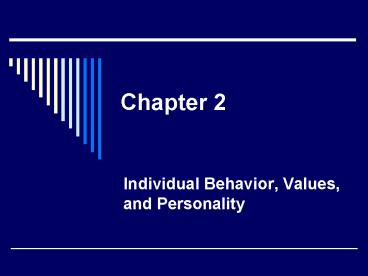Individual Behavior, Values, and Personality - PowerPoint PPT Presentation
1 / 27
Title:
Individual Behavior, Values, and Personality
Description:
Forces within a person that affect direction, intensity, & persistence of his ... Prevents 'corporate cult' Values Across Cultures. 5 Cross-Cultural Values: ... – PowerPoint PPT presentation
Number of Views:2437
Avg rating:3.0/5.0
Title: Individual Behavior, Values, and Personality
1
Chapter 2
- Individual Behavior, Values, and Personality
2
Chapter Outline
- MARS Model
- Types of Individual Behavior in Organizations
- Values in the Workplace
- Values Across Cultures
- Ethical Values Behavior
- Personality in Organizations
3
MARS Model
Values Personality Perceptions Emotions Attitudes
Stress
Individual Behavior and Results
4
MARS ModelMotivation
- Forces within a person that affect direction,
- intensity, persistence of his/her voluntary
- behavior.
- Direction
- Motivation in goal oriented
- Intensity
- Amount of effort
- Persistence
- Continue the effort
5
MARS ModelAbility
- Natural aptitudes learned capabilities
- required to successfully complete a task.
- Competencies
- Personal characteristics leading
- to superior performance
- Person-job matching
6
MARS ModelRole Perceptions
- Beliefs about what behavior is required to
- achieve desired results.
- Understanding what tasks to perform
- Understanding relative importance of tasks
- Understanding preferred behaviors to accomplish
tasks
7
MARS ModelSituational Factors
- Environmental conditions beyond the
- employees immediate control that
- constrain or facilitate behavior.
- Time
- People
- Budget
- Work Facilities
- Economic Conditions
8
Types of Behavior in Organizations
Task Performance
Types ofWork-RelatedBehavior
Organizational Citizenship
Maintaining Work Attendance
Counter- Productive Behaviors
Joining/Staying with the Organization
9
Values in the Workplace
- Values stable, long-lasting beliefs about
- what is important define right or wrong,
- good or bad.
- Value System arrange values into a
- hierarchy of preferences.
- Espoused
- What we want others to believe we hold
- Enacted
- Values in use, what we actually practice
10
Schwartzs Values Model
Self-transcendence
Openness to Change
Conservation
Self-enhancement
11
Values in the Workplace
- Values Congruence having similar
- value systems.
- Consequences of incongruence
- Incompatible decisions
- Lower satisfaction commitment
- Increased stress turnover
- Benefits of incongruence
- Better decision making
- Prevents corporate cult
12
Values Across Cultures
- 5 Cross-Cultural Values
- Individualism and Collectivism
- Power Distance
- Uncertainty Avoidance
- Achievement vs. Nurturing Orientation
- Long-term vs. Short-term Orientation
13
Values Across CulturesIndividualism
Collectivism
- Individualism
- Value independence, personal uniqueness
- Relates to self-direction dimension
- Collectivism
- Value duty to groups, group harmony
- Relates to conservation range of values
14
Values Across CulturesIndividualism
Collectivism
- Two concepts are unrelated
- Cultures may have both high individualism high
collectivism - Americans with European heritage are more
individualistic
15
Values Across CulturesIndividualism
Collectivism
Peru
High
Italy
Portugal
Taiwan
Zimbabwe
China
Collectivism
Turkey
Mexico
Chile
Hong Kong
Korea
U.S.A.
France
Japan
Egypt
Low
Individualism
Low
High
16
Values Across CulturesPower Distance
High
China
Russia
The degree that people accept an unequal
distribution of power in society
Japan
U.S.A.
Netherlands
Low
17
Values Across CulturesPower Distance
- Korean culture meets American values in
Montgomery, AL - Koreas high power distance culture
- Reveres hierarch power of executives
18
Values Across CulturesUncertainty Avoidance
High
Japan
France
The degree that people tolerate ambiguity (low
U.A.) or feel threatened by ambiguity (high
U.A.).
China
U.S.A.
Singapore
Low
19
Values Across CulturesAchievement vs. Nurturing
Achievement
Japan
U.S.A.
The degree that people value assertiveness,
competitiveness, materialism (achievement)
versus relationships well-being of others
(nurturing)
China
Russia
Nurturing
20
Values Across CulturesLong vs. Short-Term
Orientation
Long-Term
China
Japan
The degree that people value thrift, savings,
persistence (long-term) versus past present
issues, respect for tradition fulfilling social
obligations (short-term).
Netherlands
U.S.A.
Russia
Short-Term
21
Ethical Values BehaviorThree Ethical
Principles
Utilitarianism
Greatest good for the greatest number of people
Individual Rights
Fundamental entitlementsin society
Distributive Justice
People who are similar should receive similar
benefits
22
Personality in Organizations
- Personality relatively stable pattern of
- behaviors consistent internal states that
- explain a persons behavioral tendencies.
- Less evident in situations constrained by social
norms - Genetics vs. environment
23
Personality in OrganizationsThe Big Five
Dimensions
Careful, dependable
Courteous, caring
Anxious, hostile
Sensitive, flexible
Outgoing, talkative
24
Personality in OrganizationsMyers-Briggs Type
Indicator
25
Personality in OrganizationsLocus of Control
- Internal locus of control
- Believe they are very much in charge of their own
destiny - External locus of control
- Believe events in their life are due mainly to
fate/luck
26
Personality in OrganizationsLocus of Control
- Research results show internals generally
- More successful earn more money
- Well-suited to leadership positions
- More satisfied with their jobs
- Handle stressful events better
- More motivated by performance-based reward
systems
27
Personality in OrganizationsSelf-Monitoring
- Self-monitoring individuals level of
- sensitivity ability to adapt to situational
- cues.
- High Self-Monitors
- Better conversationalists
- Better organizational leaders
- More likely to be promoted































